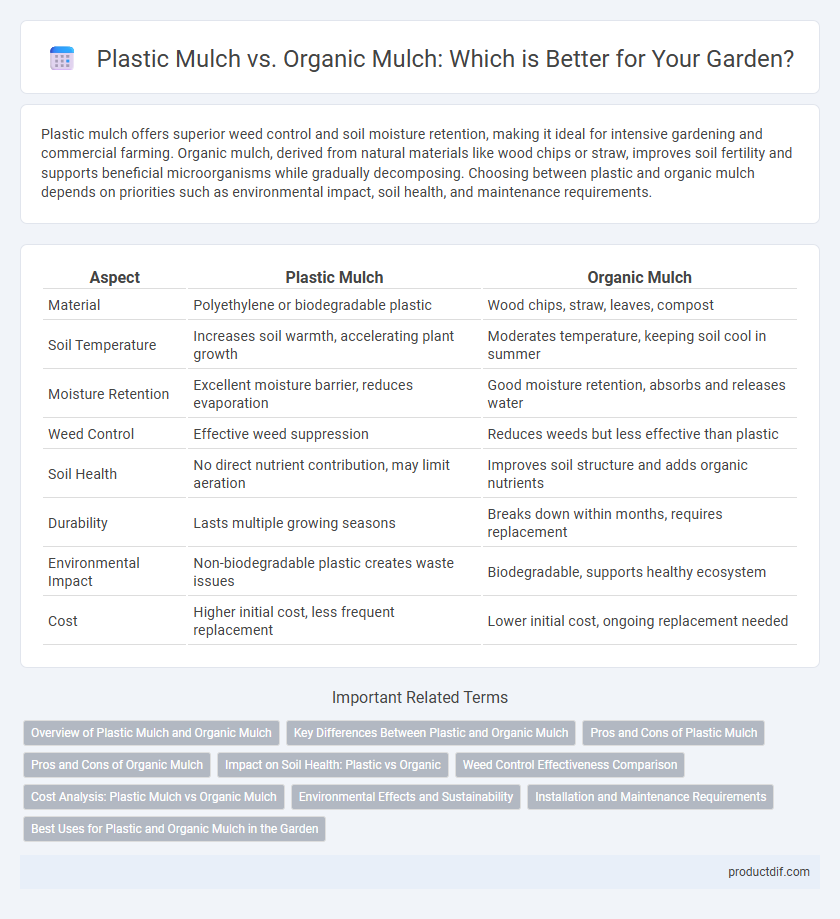Plastic mulch offers superior weed control and soil moisture retention, making it ideal for intensive gardening and commercial farming. Organic mulch, derived from natural materials like wood chips or straw, improves soil fertility and supports beneficial microorganisms while gradually decomposing. Choosing between plastic and organic mulch depends on priorities such as environmental impact, soil health, and maintenance requirements.
Table of Comparison
| Aspect | Plastic Mulch | Organic Mulch |
|---|---|---|
| Material | Polyethylene or biodegradable plastic | Wood chips, straw, leaves, compost |
| Soil Temperature | Increases soil warmth, accelerating plant growth | Moderates temperature, keeping soil cool in summer |
| Moisture Retention | Excellent moisture barrier, reduces evaporation | Good moisture retention, absorbs and releases water |
| Weed Control | Effective weed suppression | Reduces weeds but less effective than plastic |
| Soil Health | No direct nutrient contribution, may limit aeration | Improves soil structure and adds organic nutrients |
| Durability | Lasts multiple growing seasons | Breaks down within months, requires replacement |
| Environmental Impact | Non-biodegradable plastic creates waste issues | Biodegradable, supports healthy ecosystem |
| Cost | Higher initial cost, less frequent replacement | Lower initial cost, ongoing replacement needed |
Overview of Plastic Mulch and Organic Mulch
Plastic mulch offers excellent weed control and soil moisture retention by creating a barrier that warms the soil and reduces evaporation, making it ideal for vegetable and fruit production. Organic mulch, such as straw, wood chips, or compost, enhances soil fertility by decomposing and adding nutrients, while also improving soil structure and supporting beneficial microbial activity. Both types of mulch contribute to improved crop yields but serve different purposes depending on garden needs and environmental considerations.
Key Differences Between Plastic and Organic Mulch
Plastic mulch creates a barrier that conserves soil moisture and controls weeds more effectively than organic mulch, which decomposes over time and enriches the soil with nutrients. Organic mulch improves soil structure and supports beneficial microbial activity, whereas plastic mulch can increase soil temperature and reduce oxygen exchange. Choosing between plastic and organic mulch depends on garden goals such as soil health improvement or weed suppression efficiency.
Pros and Cons of Plastic Mulch
Plastic mulch offers superior weed control and soil moisture retention compared to organic mulch, significantly improving crop yields and reducing irrigation needs. However, it lacks the ability to enrich soil with nutrients and requires proper disposal to avoid environmental pollution, as it is not biodegradable. The initial cost of plastic mulch is higher than organic alternatives, but its durability can make it more cost-effective for long-term use in intensive garden supply scenarios.
Pros and Cons of Organic Mulch
Organic mulch improves soil fertility by decomposing and adding nutrients, supports beneficial microbial activity, and enhances moisture retention while regulating soil temperature. It can attract pests and requires periodic replenishment due to decomposition, which increases maintenance compared to plastic mulch. Organic mulch also reduces environmental impact by being biodegradable and promoting healthier, sustainable gardening practices.
Impact on Soil Health: Plastic vs Organic
Organic mulch improves soil health by enhancing microbial activity, increasing moisture retention, and slowly releasing nutrients as it decomposes. Plastic mulch, while effective for weed control and moisture conservation, does not contribute to soil fertility and can hinder gas exchange and microbial diversity. Long-term use of organic mulch supports sustainable soil ecosystems, whereas plastic mulch may lead to soil degradation if residual fragments remain.
Weed Control Effectiveness Comparison
Plastic mulch offers superior weed control by creating an impermeable barrier that blocks sunlight, preventing weed seed germination more effectively than organic mulch. Organic mulch, such as straw or wood chips, suppresses weeds by shading them and improving soil health but may require thicker layers and more frequent replenishment to maintain efficacy. Studies show plastic mulch can reduce weed growth by up to 90%, whereas organic mulch typically achieves 60-70% weed suppression under optimal conditions.
Cost Analysis: Plastic Mulch vs Organic Mulch
Plastic mulch typically involves higher upfront costs due to material purchase and installation but offers long-term savings by reducing weed control and conserving soil moisture. Organic mulch, such as wood chips or straw, has lower initial expenses but requires regular replenishment, increasing ongoing maintenance costs. Evaluating the cost-effectiveness depends on garden size, labor availability, and specific crop requirements.
Environmental Effects and Sustainability
Plastic mulch reduces soil erosion and conserves moisture but contributes to microplastic pollution and landfill waste, posing long-term environmental risks. Organic mulch enhances soil health by improving nutrient content and supporting microbial activity while breaking down naturally without harmful residues. Choosing organic mulch promotes sustainability through carbon sequestration and reduced reliance on petroleum-based products.
Installation and Maintenance Requirements
Plastic mulch offers a quick installation process with lightweight, easy-to-handle sheets that require anchoring around plant bases. Organic mulch demands a more labor-intensive application, as it involves spreading thicker, uneven layers of natural materials like wood chips or straw. Maintenance of plastic mulch involves periodic inspection for tears and replacement, whereas organic mulch needs regular replenishment and monitoring for decomposition and pest activity.
Best Uses for Plastic and Organic Mulch in the Garden
Plastic mulch excels in vegetable gardens by conserving soil moisture, regulating temperature, and suppressing weeds, making it ideal for crops like tomatoes, peppers, and melons. Organic mulch, such as wood chips or straw, is best suited for flower beds and around shrubs, where it improves soil fertility and supports beneficial microbial activity. Choosing the right mulch depends on crop type and garden goals, balancing moisture retention and soil health.
Plastic mulch vs Organic mulch Infographic

 productdif.com
productdif.com